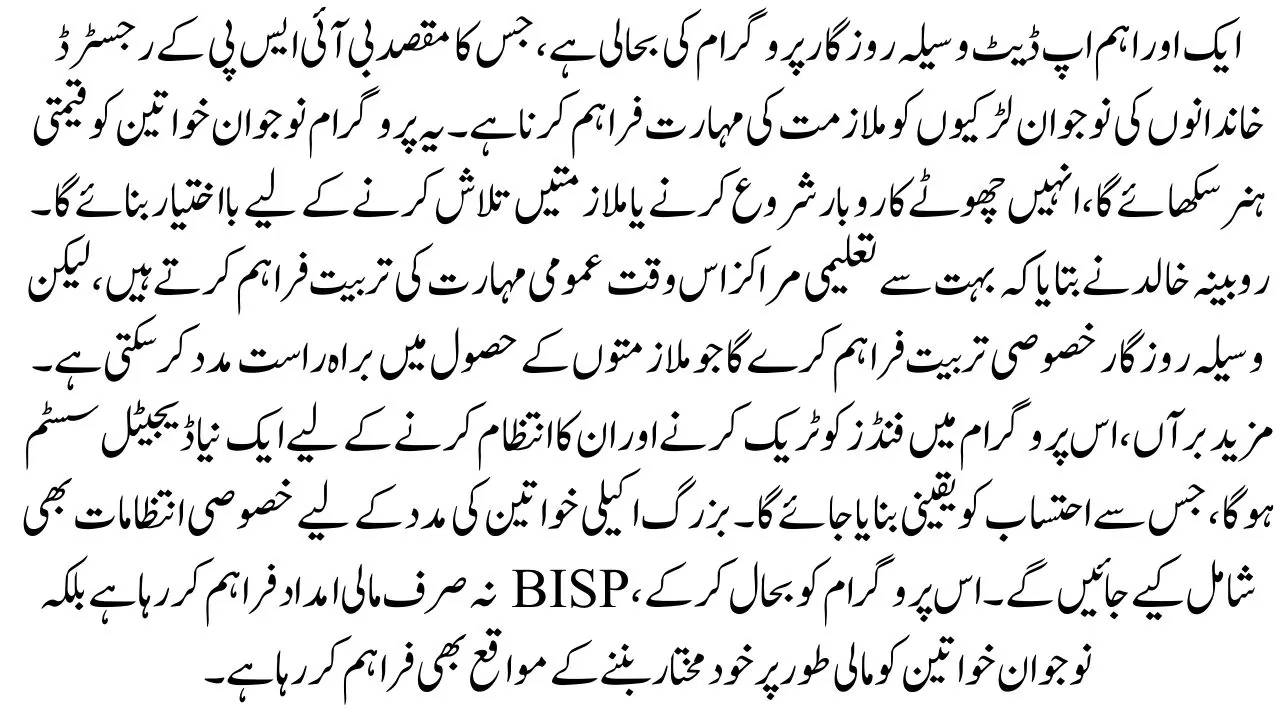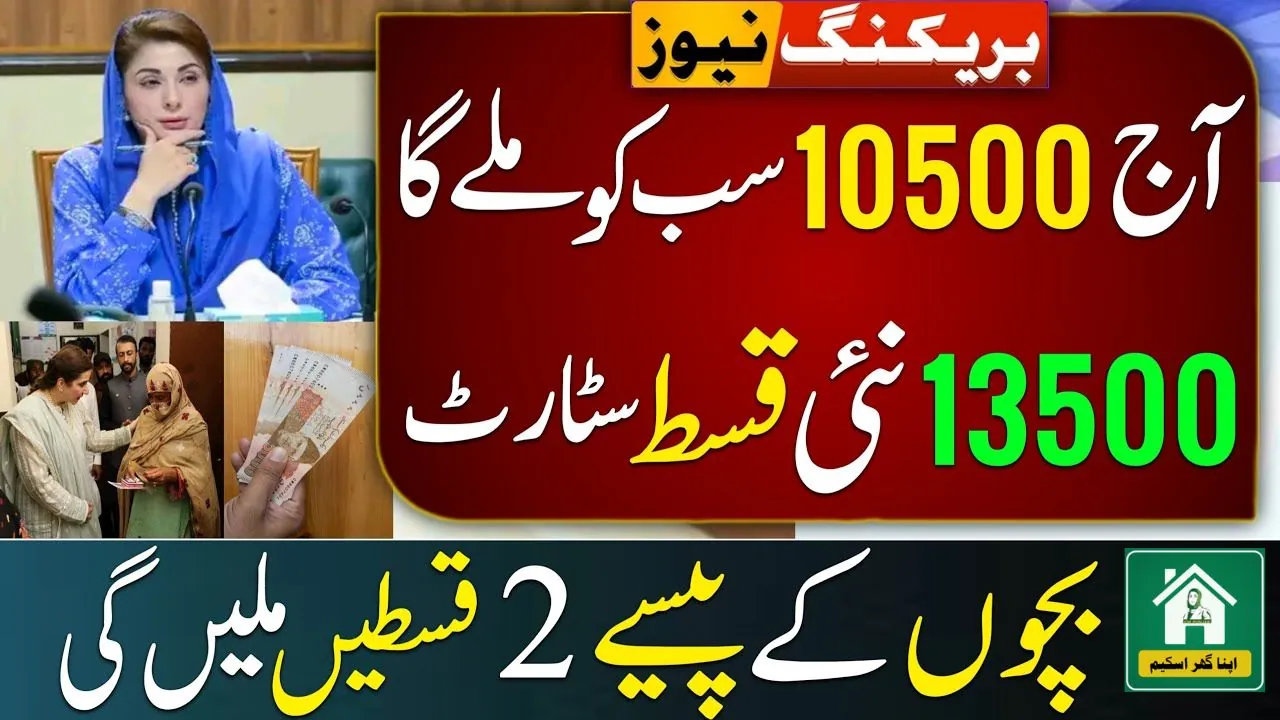Contents
- 1 BISP
- 2 The Program Will Reach 10 Million People by December: Rubina Khalid’s Announcement
- 3 New Payment System to Ensure Transparency
- 4 Wasela-e-Rozgar Program Revival
- 5 Quarterly Payment Increase for Beneficiaries
- 6 BISP Program Requirements for New Applicants
- 7 Focus on Respect and Dignity for Beneficiaries
- 8 Conclusion
BISP
The Benazir Income Support Program (BISP) is an important initiative in Pakistan designed to help low-income families by providing financial aid. Recently, Rubina Khalid, the Chairperson of BISP, announced that the program will expand to reach 10 million beneficiaries by December 2024. BISP has been a vital source of support for families struggling to cover basic expenses, and with this increase, even more people will benefit. The new expansion includes an improved payment system and increased funds for beneficiaries. This article will provide details on the BISP update, the new payment system, the requirements for new applicants, and the revival of skill development programs.
The Program Will Reach 10 Million People by December: Rubina Khalid’s Announcement
In a recent media discussion, Rubina Khalid stated that by December 2024, BISP will support 10 million individuals. This growth is part of the government’s commitment to help the poorest families by reducing the gap between their income and expenses. Last year, the program helped around 9.3 million people, and the target for this year is even higher. According to Rubina, BISP is receiving new applications every day, reflecting the ongoing need for financial assistance in Pakistan. With this increase, BISP aims to improve the lives of more families, allowing them to meet basic needs such as food and shelter.
New Payment System to Ensure Transparency
Rubina Khalid also shared that a new payment system will be introduced to make the distribution of funds more transparent. In the current system, only two banks handle the payment process, which has sometimes led to delays and issues. Under the new system, six banks will be authorized to manage BISP payments. By partnering with more banks, BISP can ensure faster and more accurate delivery of funds to beneficiaries. This change will reduce the risk of errors and make it easier for recipients to access their funds. The new system will also eliminate human involvement in the distribution process, further ensuring that payments are fair and on time.
Wasela-e-Rozgar Program Revival
Another important update is the revival of the Wasela-e-Rozgar Program, which aims to provide job skills to young girls from BISP-registered families. This program will teach valuable skills to young women, empowering them to start small businesses or find jobs. Rubina Khalid mentioned that many learning centers currently offer general skills training, but Wasela-e-Rozgar will provide specialized training that can directly help in securing jobs. Additionally, this program will have a new digital system to track and manage funds, ensuring accountability. Special provisions will also be included to support elderly single women. By reviving this program, BISP is not only providing financial aid but also creating opportunities for young women to become financially independent.

Quarterly Payment Increase for Beneficiaries
The government has announced a budget increase for BISP, which will allow the program to raise the quarterly payment for beneficiaries. Starting from January 2025, each BISP recipient will receive an additional Rs 13,500 every quarter. This increase in funds will give families a bit more financial stability, helping them manage essential costs like food, healthcare, and education. For newly registered members, payments will start as soon as their application is approved. This increase reflects the government’s understanding of the financial difficulties faced by low-income families and their commitment to providing the support needed to make life easier for them.
BISP Program Requirements for New Applicants
Rubina Khalid also spoke about the registration requirements for new applicants. To make the process accessible, BISP has introduced a Dynamic Survey, which allows people to apply for the program online. New applicants must provide some basic documents, including their CNIC, electricity bill, and “B” form. These documents help verify eligibility and make sure that only deserving people receive assistance. The survey is also designed to make the registration process easy for applicants, helping more families join the program without any hassle. By simplifying the requirements, BISP is ensuring that the program is open to all those who genuinely need financial support.
Focus on Respect and Dignity for Beneficiaries
One of the unique aspects of BISP is its commitment to ensuring that beneficiaries receive their payments with respect and dignity. Asif Ali Zardari has instructed BISP officials to make sure that the aid process is handled with care, ensuring that people do not feel embarrassed or ashamed for seeking help. This approach is important because it values the dignity of beneficiaries, treating them with respect while providing essential financial aid. BISP’s focus on dignity shows the program’s aim to help people without making them feel uncomfortable about receiving assistance.
Also Read: How To Apply for Rs 10,500 With 1312 Himmat Card: Online Status Check
Conclusion
The Benazir Income Support Program (BISP) is making significant progress in expanding its reach to support more families across Pakistan. By December 2024, the program will serve 10 million beneficiaries, providing them with quarterly financial aid. The new payment system involving six banks will make transactions more transparent and efficient, while the Wasela-e-Rozgar Program will give young women skills to become self-reliant. The increased quarterly payment, new applicant requirements, and the focus on respect and dignity all highlight BISP’s commitment to improving lives. Through these updates, BISP is working to lift families out of poverty, giving them the resources and opportunities they need to build a better future.


Muj pasei k masla h
Business ke liye
میں بے روزگار ھوں مجھے روزگار دیلا دیں میں کرائے کے گھر میں ھوں مہربانی ھوگی
میری مدد فرمائےں
. . . . شکریہ . . .
Mjhy aj tk kuch ni mila jb k main mustahik bhe hn ????
Mujha BHi AJ tak khoch Ni mila